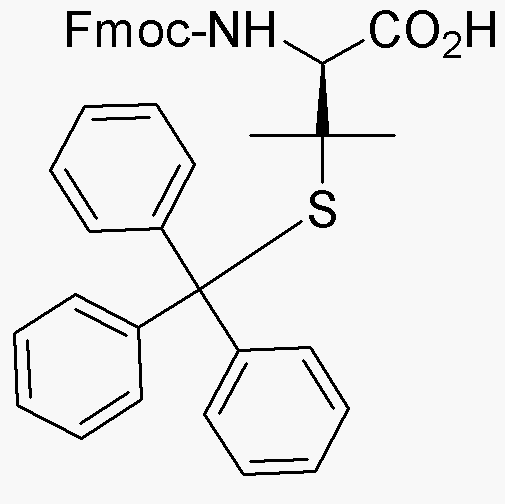Fmoc-S-trityl-D-penicillamine is widely utilized in research focused on:
- Peptide Synthesis: This compound serves as a protecting group in the synthesis of peptides, allowing for selective reactions and improved yields. It is particularly useful in solid-phase peptide synthesis, where efficiency is crucial.
- Drug Development: Its unique structure aids in the design of novel pharmaceuticals, especially in the development of drugs targeting specific diseases. Researchers can modify the compound to enhance bioactivity and reduce side effects.
- Bioconjugation: The compound is employed in bioconjugation processes, linking biomolecules to therapeutic agents. This application is vital in creating targeted drug delivery systems, improving treatment efficacy.
- Analytical Chemistry: It is used in various analytical techniques, such as chromatography, to separate and identify compounds. Its stability and reactivity make it a reliable choice for researchers needing precise measurements.
- Material Science: Fmoc-S-trityl-D-penicillamine finds applications in the development of advanced materials, including polymers and nanomaterials, due to its ability to form stable bonds and enhance material properties.
General Information
Properties
Safety and Regulations
Applications
Fmoc-S-trityl-D-penicillamine is widely utilized in research focused on:
- Peptide Synthesis: This compound serves as a protecting group in the synthesis of peptides, allowing for selective reactions and improved yields. It is particularly useful in solid-phase peptide synthesis, where efficiency is crucial.
- Drug Development: Its unique structure aids in the design of novel pharmaceuticals, especially in the development of drugs targeting specific diseases. Researchers can modify the compound to enhance bioactivity and reduce side effects.
- Bioconjugation: The compound is employed in bioconjugation processes, linking biomolecules to therapeutic agents. This application is vital in creating targeted drug delivery systems, improving treatment efficacy.
- Analytical Chemistry: It is used in various analytical techniques, such as chromatography, to separate and identify compounds. Its stability and reactivity make it a reliable choice for researchers needing precise measurements.
- Material Science: Fmoc-S-trityl-D-penicillamine finds applications in the development of advanced materials, including polymers and nanomaterials, due to its ability to form stable bonds and enhance material properties.
Documents
Safety Data Sheets (SDS)
The SDS provides comprehensive safety information on handling, storage, and disposal of the product.
Product Specification (PS)
The PS provides a comprehensive breakdown of the product’s properties, including chemical composition, physical state, purity, and storage requirements. It also details acceptable quality ranges and the product's intended applications.
Certificates of Analysis (COA)
Search for Certificates of Analysis (COA) by entering the products Lot Number. Lot and Batch Numbers can be found on a product’s label following the words ‘Lot’ or ‘Batch’.
*Catalog Number
*Lot Number
Certificates Of Origin (COO)
This COO confirms the country where the product was manufactured, and also details the materials and components used in it and whether it is derived from natural, synthetic, or other specific sources. This certificate may be required for customs, trade, and regulatory compliance.
*Catalog Number
*Lot Number
Safety Data Sheets (SDS)
The SDS provides comprehensive safety information on handling, storage, and disposal of the product.
DownloadProduct Specification (PS)
The PS provides a comprehensive breakdown of the product’s properties, including chemical composition, physical state, purity, and storage requirements. It also details acceptable quality ranges and the product's intended applications.
DownloadCertificates of Analysis (COA)
Search for Certificates of Analysis (COA) by entering the products Lot Number. Lot and Batch Numbers can be found on a product’s label following the words ‘Lot’ or ‘Batch’.
*Catalog Number
*Lot Number
Certificates Of Origin (COO)
This COO confirms the country where the product was manufactured, and also details the materials and components used in it and whether it is derived from natural, synthetic, or other specific sources. This certificate may be required for customs, trade, and regulatory compliance.


